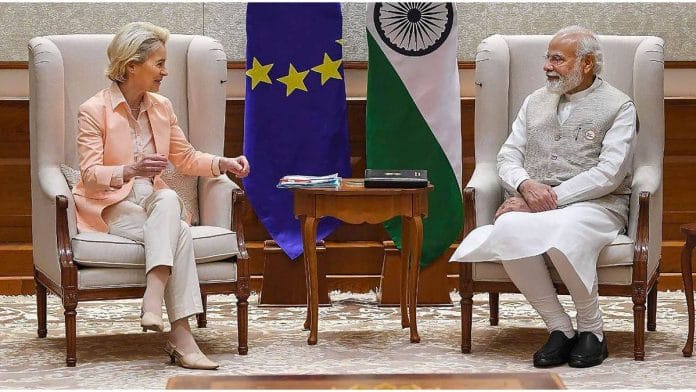New Delhi: The European Union (EU) is now looking to do more business with India by way of greater investments in Europe as tension with Russia over the Ukraine war and geopolitical concerns with China pose massive challenges to the bloc and the world at large.
With the EU imposing stringent actions on Russia, Brussels is now putting its focus back on India by trying to expedite the long pending free trade agreement with New Delhi as well as a separate investment pact, negotiations for which will be launched soon.
In addition, EU’s growing tensions with China is forcing European companies to look for other destinations to open their shops and it believes India can play a critical role in that.
“We don’t want to solely depend on China for manufacturing products. So, there is strong support from the government to bring some production back to the EU, and there are plans (that are being designed). But we know that there will be costs. We cannot bring everything into Europe and that’s where India comes into the picture,” French ambassador Emmanuel Lenain said at a business interaction. “We know that in the next two decades at least, we won’t experience that kind of uncertainty and discomfort that we have with China.”
In April, EU chief Ursula von der Leyen had arrived in the country for a two-day visit to bolster strategic partnership with India. Trade in goods and services between the two sides stood at Euro 96 billion in 2020. Though the EU is India’s third largest trading partner and second largest export destination, von der Leyen had asserted that there remained a ‘lot of untapped potential’ for the two partners.
Among the 27 EU member countries, France has emerged as the topmost destination for foreign investments surpassing Germany and the UK, as per an EY Attractiveness Survey released recently. A post-COVID-19 rebound caused investment in France to soar 24 per cent to 1,222 projects in 2021, the report said. Investment in the UK remained steady, increasing by 2 per cent to 993 projects. In contrast, the number of projects in Germany tumbled by 10 per cent to 841.
“The war in Ukraine, soaring inflation and potentially burdensome regulation are the key factors that may slow foreign investment in Europe in the long term … Businesses remain optimistic that Europe will retain its status as a highly attractive long-term destination for foreign investment. But policymakers cannot afford to sit back. Many factors could undermine the continent’s long-term attractiveness, not least the war in Ukraine,” said the survey.
France along with the EU, Lenain said, will ensure that it does business only with countries that believe in the rule of law and democratic rights.
India and Bangladesh have benefitted the most as more and more French textile companies move out of China, said Ugo Astuto, EU envoy to India. Europe is emerging as the most attractive destination for Indian companies as businesses face difficulties and more complex global supply chains that are riddled with challenges which did not exist before, he added.
Also Read: We won’t lecture, but want to boost India’s strategic autonomy, says French ambassador
Looking beyond UK for European markets
According to the French ambassador, the Modi government has given “good signals” by signing free trade agreements with the United Arab Emirates (UAE) and Australia. The EU, however, is looking at a more “ambitious” trade pact with India as it plans to address challenges facing businesses due to the growing geopolitical tensions, he said.
India is also negotiating a free trade agreement with the UK separately as post Brexit, Britain is seeking more and more investments. In the last week of May, Commerce and Industry Minister Piyush Goyal said that the agreement could be ready by Diwali (in October).
But according to Lenain, it will be difficult for India to export to the European markets through the UK as it is subject to several tariff and non-tariff barriers as well as anti-dumping duties. Post-Brexit, he said, the UK does not have the same easy access to the EU markets. So, if India wants to get “continental access” for its goods and services exports, New Delhi should do so through other EU member states, he added.
According to the EY report, Brexit and COVID-19 have had a dual negative impact on the UK where investment growth was found to be 10 per cent below pre-pandemic levels. “…the country is impacted by concerns about trade restrictions and labor shortages, which are in part caused by Brexit,” the report said.
On the contrary, the report said, France benefited from a very significant post-COVID-19 rebound because the impact of the health crisis was more acute in 2020 than the European average. “Surge in investment (in France) was driven by manufacturing projects, particularly in the automotive, aeronautics and consumer industries: Businesses announced 482 manufacturing projects in 2021, a 41 per cent annual increase,” it said.
Also Read: What is India-EU Trade and Technology Council, and how it will help ongoing FTA negotiations
(Edited by Tony Rai)






